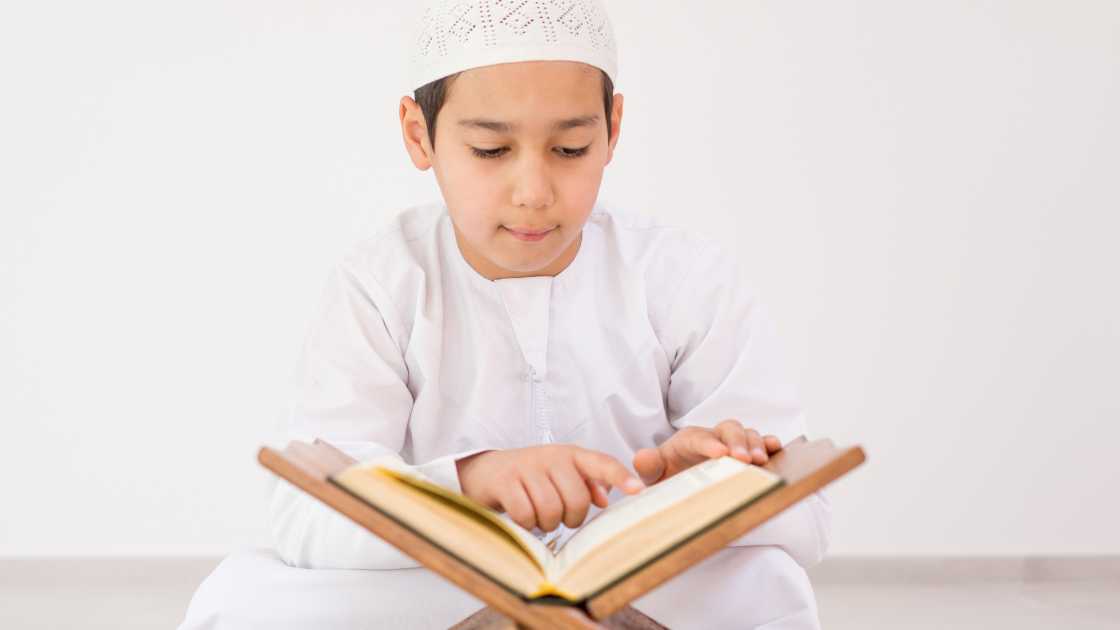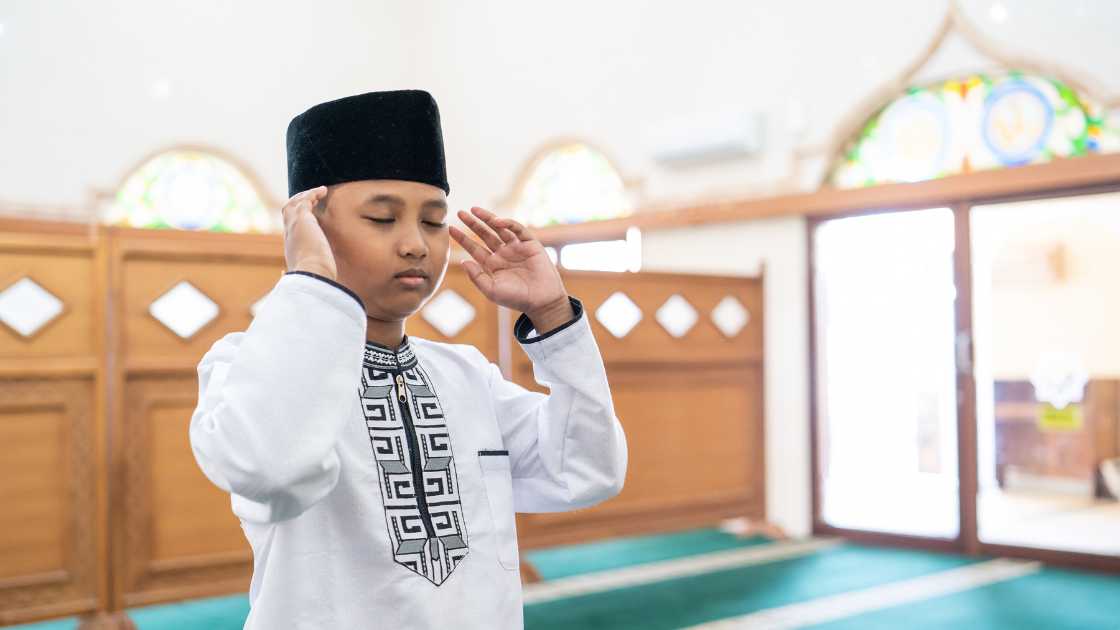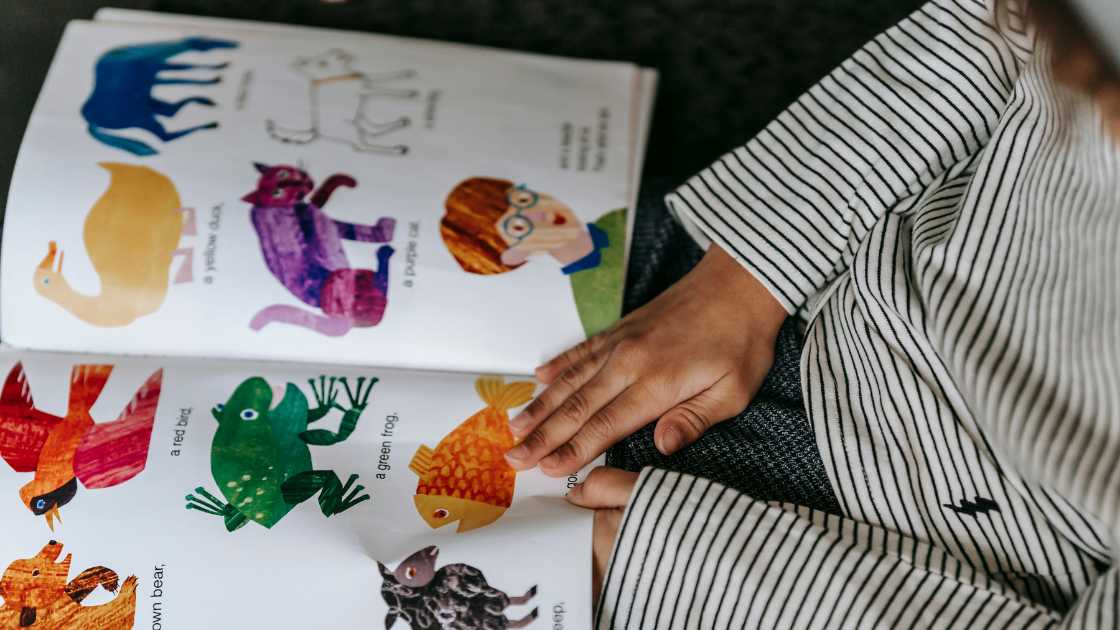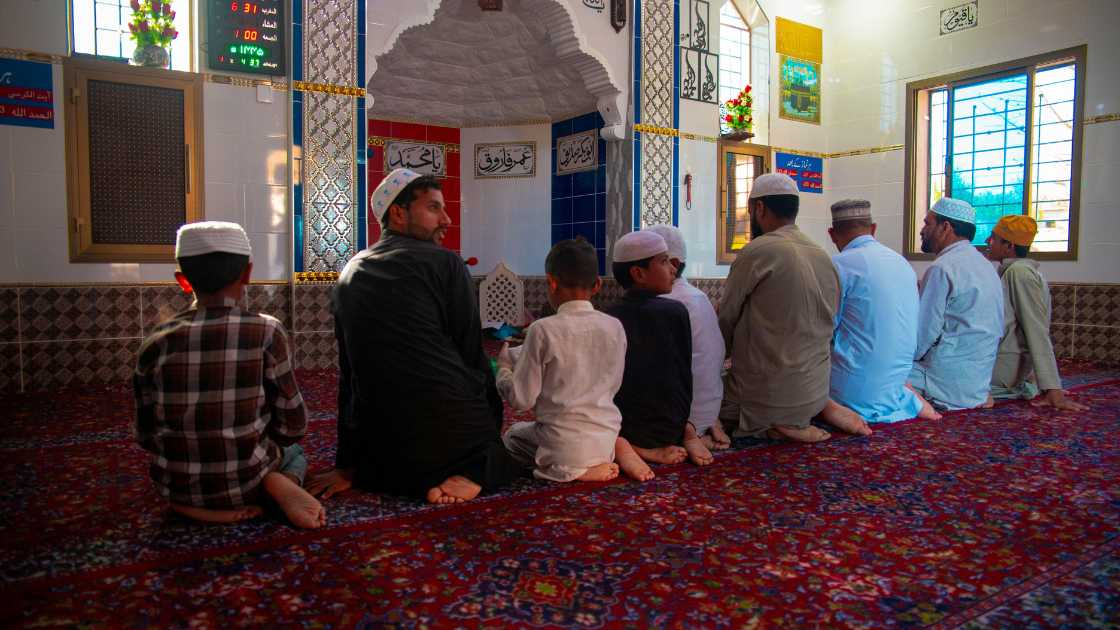
Teaching children Islam is no easy feat, especially for new parents plundering into their parenthood phase.
Parents might second guess themselves, not knowing where to begin to teach Islam for children, as the concepts and obligations can be overwhelming for kids to understand.
However, we laid out a list of tips on teaching children Islam the guided way so you know where to begin to introduce Islam to kids.
Before we explore myriad of tips on teaching children Islam, let’s first dive into the how Islam obliges parents and entrusts them with the Amanah to educate their children to be beacons of hope and humanity.

The Quran and hadith mentions many times on the importance to instill teachings of Islam in children, some specific and some in a more generic theme of knowledge seeking as a primary pursuit in our life.
يَـٰبُنَىَّ أَقِمِ ٱلصَّلَوٰةَ وَأْمُرْ بِٱلْمَعْرُوفِ وَٱنْهَ عَنِ ٱلْمُنكَرِ وَٱصْبِرْ عَلَىٰ مَآ أَصَابَكَ ۖ إِنَّ ذَٰلِكَ مِنْ عَزْمِ ٱلْأُمُورِ
Keep up the prayer, my son; command what is right; forbid what is wrong; bear anything that happens to you steadfastly: these are things to be aspired to. [Quran 31:17]
There is a specific Surah just on the counsel between Luqman and his son. In this Surah, Luqman is imparting good advice to his son, showing the responsibility of a parent towards their children.
يَـٰٓأَيُّهَا ٱلَّذِينَ ءَامَنُوا۟ قُوٓا۟ أَنفُسَكُمْ وَأَهْلِيكُمْ نَارًۭا وَقُودُهَا ٱلنَّاسُ وَٱلْحِجَارَةُ عَلَيْهَا مَلَـٰٓئِكَةٌ غِلَاظٌۭ شِدَادٌۭ لَّا يَعْصُونَ ٱللَّهَ مَآ أَمَرَهُمْ وَيَفْعَلُونَ مَا يُؤْمَرُونَ
Believers, guard yourselves and your families against a Fire fuelled by people and stones, over which stand angels, stern and strong; angels who never disobey God’s commands to them, but do as they are ordered. [Quran 66:6]
Not only that, but in another Surah as mentioned above, it is the responsibility of the leader of the family to bring all members on the righteous path, preventing from the Hellfire.
There are many ways on teaching children Islam in a guided way. It is important to remember that these tips are to be done consistently to see a change, not done once or overnight!

Teaching Islamic knowledge to kids begins with discussing the concept of the existence of Allah Almighty.
It might be a difficult and heavy topic to dive into, since children might not be able to make sense of it yet, but focus on the nature or surroundings and link it to them as being Creations of Allah.
ۗ كَذَٰلِكَ يُبَيِّنُ ٱللَّهُ لَكُمُ ٱلْـَٔايَـٰتِ لَعَلَّكُمْ تَتَفَكَّرُونَ
God makes His messages clear to you, so that you may reflect. [Quran 2:219]
Point to everyday wonders, such as the sun, the moon, or the growth of plants, and explain, "Allah created this." This repetition reinforces their understanding of Allah as the Creator.

The responsibility of Muslim parents is not just limited to teaching children Islam in a conceptual or cognitive sense, but also spiritual.
Introduce them to the 99 Names of Allah, emphasizing His Divine Mercy, Compassion, and Greatness through stories from the Quran and Hadith.
One example would be the Divine Mercy of Allah Almighty, Ar-Rahmah.
Abu Hurairah (May Allah be pleased with him) reported:
The Prophet (ﷺ) said, "When Allah loves a slave, calls out Jibril and says: 'I love so-and-so; so love him'. Then Jibril loves him. After that he (Jibril) announces to the inhabitants of heavens that Allah loves so- and-so; so love him; and the inhabitants of the heavens (the angels) also love him and then make people on earth love him". [Al- Bukhari and Muslim]

Prophet Muhammad ﷺ is a role model for every Muslim. Teach children about his kindness, patience, and love for humanity. There is much to learn from the Prophet ﷺ who was entrusted to change humanity.
There are many
Islamic books on the Prophet Muhammad ﷺ you can browse through, so use the opportunity to share inspiring stories of his life that resonate with their daily experiences, helping them emulate his exemplary character.
قُلْ إِن كُنتُمْ تُحِبُّونَ ٱللَّهَ فَٱتَّبِعُونِى يُحْبِبْكُمُ ٱللَّهُ وَيَغْفِرْ لَكُمْ ذُنُوبَكُمْ ۗ وَٱللَّهُ غَفُورٌۭ رَّحِيمٌۭ
Say, ‘If you love God, follow me, and God will love you and forgive you your sins; God is most forgiving, most merciful.’ [Quran 3:31]

One of the ways to teach children Islam is to introduce children to the five pillars of Islam and their significance.
Start with simple explanations on each pillar and encourage them to practice these principles one step at a time at their own pace.
For instance, if your child is ready to fulfil their prayer obligations, you may find ways on how to teach a child to pray in islam that fits your child’s learning style.
Consistency is key, and it is important that they don’t see this as a boring chore, but a fun and interesting way to build their faith.
“Take up good deeds only as much as you are able, for the best deeds are those done regularly even if they are few.’ (Ibn Majah)

Islamic education for kids is incomplete without instilling good manners or adab. Teach them the importance of respect and acting according to the teachings of our beloved Prophet ﷺ.
That is also the reason why learning the Sunnah of the Prophet ﷺ is essential for all Muslims, to emulate his sublime characteristics and to spread that identity of a Muslim for mankind to practice.
Some of the things you can teach your child is saying "Bismillah" before eating, respecting elders, and sharing with others—values that build character and faith.
Try Our Best-Selling Courses

The
stories of companions of the Prophet ﷺ serve as excellent role models for children. Share stories of their bravery, kindness, and devotion to Allah Almighty, inspiring your child to follow their example as well.
Some of the Companions you can look into are The Four Caliphs; Sayyidina Abu Bakr, Sayyidina Umar, Sayyidna Uthman, Sayyidina Ali, His Beloved Family (may Allah bless all of them) and more.
This is a great way to highlight that the Prophet’s ﷺ radiance and illumination of his sublime characteristics and faith has shined upon those close to him and love him for the sake of Allah Almighty.

Islamic learning for kids doesn’t have to be boring, monotonous and memorisation-based.
One of the reasons why children nowadays are uninterested in learning Islam is due to teachers’ strictness and lack of inventiveness and creativity in making learning fun and age-appropriate.
[Sunan Ibn Majah]

This is by far the most important, yet indirect way to educate your child on Islam.
Everything begins with yourself; your routine, your actions on a day to day basis. It is almost counterproductive to try your best to teach your child the essentials of Islam when you aren’t doing the part.
Children learn more by observing than listening. Demonstrate Islamic practices in your daily life, such as praying regularly and congregationally, reciting the Quran, and showing kindness to others.

What better way to teach children Islam than to emphasise on
how to make of du’a that is accepted by Allah Almighty? It is not only a means of communication with Allah Almighty directly, but also a form of worship.
An-Nu`man bin Bashir narrated that:
The Prophet said: “The supplication, is worship.” Then he recited: And Your Lord said: “Call upon me, I will respond to you. Verily, those who scorn My worship, they will surely enter Hell humiliated." [Jami’ At-Tirmidhi]
Teach
children simple and powerful duas for different occasions, such as waking up, eating, and going to bed. This nurtures their connection with Allah Almighty and instills gratitude in their hearts.

If you’re looking for courses on Islamic lessons for kids, consider enrolling your child in an online Islamic studies course.
This way, they can pursue their path towards
seeking Islamic knowledge and at the same time, enjoying the journey from the comforts of their home.
This also provides them with access to knowledgeable instructors and interactive lessons tailored to their age.

Looking to find a credible source of Islamic knowledge for kids? This is one of the most essential steps to ensuring that your child is on the right path of faith.
Encourage your children to learn directly from scholars or trusted teachers who can provide authentic Islamic knowledge, based on the teachings of Ahlus Sunnah wal Jama’ah.
Attending Islamic lectures or online sessions by reputable scholars helps clarify doubts and strengthens their understanding of the religion.

Teaching children Islam is incomplete without investing in age-appropriate Islamic books.
The best book gems highlight Islamic values, stories of prophets, and basic Islamic principles in a way children can understand and relate to.
These
Islamic books for kids can make learning fun and foster a love for reading while introducing key Islamic concepts.
Some of the best-selling Islamic children’s books include:

Did you know that the environment or surroundings can affect one’s behaviour? You might want to take advantage of this perk by bringing your child to the Masjid.
Take your children to the masjid regularly so they can witness and participate in communal prayers, learn Islamic etiquette, and feel a sense of belonging in the Muslim community.
In a sense, the reason why this is necessary: familiarity.
Once your child develops a sense of familiarity with the Masjid, they’ll grow accustomed to the Masjid culture and slowly incorporate essential values into their daily lives.
Masjids are great places for children to build friendships with peers who share their faith.

We are living in a modern era where technology is vast and inevitable.
As much as parents would want their children away from screens, it is almost impossible to do it completely. However, you can always improvise and find a way to make screen time more meaningful and beneficial for your child.
The answer: Leverage
educational Islamic apps, YouTube channels, and games for kids to make learning about Islam engaging.
Monitor screen time and ensure the content is age-appropriate and aligned with Islamic values.

Instill the traits of a good Muslim in your children, such as honesty, kindness, and respect for others. Demonstrate these values in your daily life, as children learn best through observation and practice.
In this particular lesson, parents may explore the concept of Ihsan with their children, which is mentioned perfectly in the hadith of Prophet Muhammad ﷺ:
The man again asked, "O Allah's Messenger (ﷺ) What is Ihsan (i.e. perfection or Benevolence)?" The Prophet (ﷺ) said, "Ihsan is to worship Allah as if you see Him, and if you do not achieve this state of devotion, then (take it for granted that) Allah sees you." [Sahih Al-Bukhari]

1. Use Songs and Crafts to Memorise the Names and Attributes of Allah
One thing that all content on Islamic learning for kids have in common; they all have some form of music to increase memory retention in kids.
Introduce children to the beautiful names of Allah (Asma’ul Husna) through songs and crafts.
You may recite the Asma’ul Husna in a catchy yet calming rhythm, or even create activities like drawing a name and discussing what it means in a simple, relatable way.
2. Help them Memorise the Pillars of Islam with Flashcards
To teach the basics of Islam for kids like the five pillars of Islam, you may use visual aids like flashcards or a colorful chart.
Since there are only five pillars, lay them all out in flashcards for them to refer to easily. To add more fun, add vibrant colors and graphics to capture children’s attention!
3. Life of the Prophets Storytime
Focus on the important lessons like kindness, patience, and trust in Allah Almighty, instead of the more intricate facts like historical dates etc, which can be boring for kids.
4. Category Game: Understanding Halal and Haram
Explain the concepts of halal and haram using everyday examples, such as food choices or behavior.
To turn it into a game or use in Islamic lessons for kids, you may use sorting activities to make it interactive and fun. Divide a table into ‘Halal’ and ‘Haram’ and list out those nouns or verbs categorised accordingly.
5. Instill Love for the Quran…the FUN way.
Teaching Islamic knowledge for kids essentially starts with the lessons from the Quran.
Inspire a love for the Quran by reciting verses with them, playing Quran recitations during playtime, or teaching them short surahs through repetition and rewards.
Learning Quran can be a daunting task, so it’s best to start with short and simple Surahs first, then slowly progress to the longer ones.
6. Positive Reinforcement Goes a Long Way
Implement a reward system to encourage Islamic habits, such as saying “Bismillah,” helping others, or completing a prayer.
Simple incentives like a sticker chart or words of praise can motivate children while fostering good habits.
However, some argue that this approach might shift a child’s focus toward seeking rewards rather than developing sincere intentions toward Allah.
To address this, adopt a balanced approach by combining praise with reminders of Allah’s recognition. For example:
"SubhanAllah, you woke up for Fajr! That must have taken a lot of effort. I’m so proud of you, and Allah is proud of you too!”
This way, children feel appreciated while understanding that their efforts are valued both by their parents and by Allah Almighty.
7. Let’s Follow the Sunnah, Follow My Lead!
Encourage Sunnah practices like eating with the right hand or saying du’as for daily activities. Lead by example and make it a routine they can easily follow.
8. Embrace Islamic Holidays and Commemorative Events
Make Islamic holidays, such as Eid or Ramadan, special by decorating your home, baking together, and sharing the significance of these occasions with stories and activities.
Not only major holidays like Eid and Ramadan, but also Islamic commemorative events like
Isra’ wal Mi’raj, Mawlidur Rasul and more.
On these days, it’s essential for parents to have a sit-down with their children to study and learn the significance of these events and how it has impacted humanity.
9. Islamic Art and Crafts
Engage children in creating Islamic-themed crafts, such as masjid models, lanterns or calligraphy.
These hands-on activities help them connect with their faith and at the same time, help them foster their creativity and inventive skills.
10. Get Your Child a Fun Prayer Mat
Besides figuring out the best way onhow to teach a child to pray in Islam, another motivation boost for them to establish prayer consistently is surprisingly a superficial one!
Gift them a colorful, child-friendly prayer mat with their name or favorite designs. This creates excitement for prayer and helps establish a positive connection with Salah.
11. Blend in with the Masjid Community
Take your children to the masjid to observe and participate in prayer, especially during quieter times. It builds familiarity with the environment and encourages a sense of community.
Subscribe to Our Newsletter
Stay updated on our free courses, promotions, events and more!

























